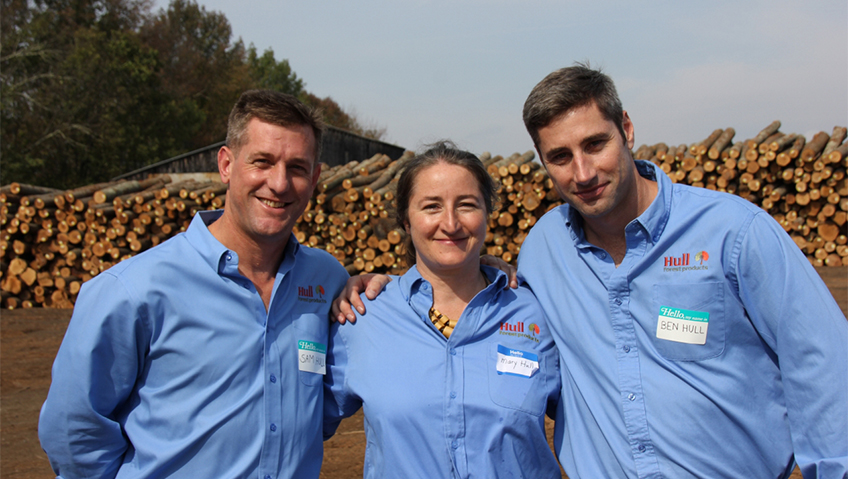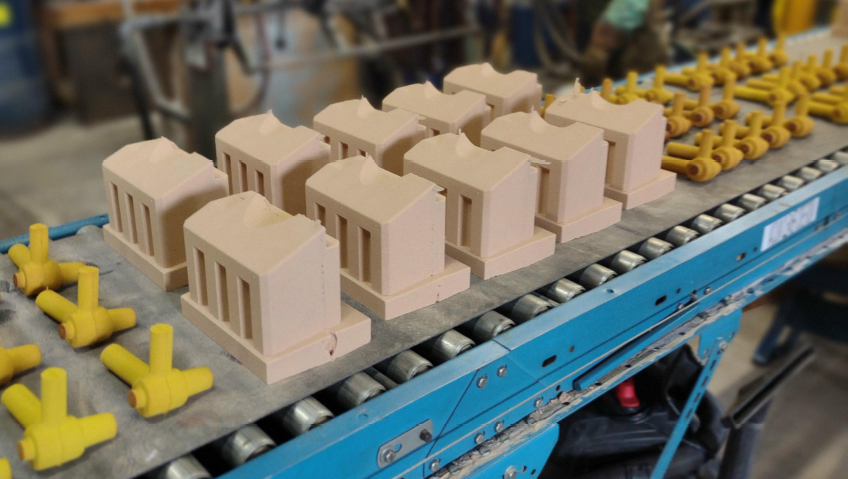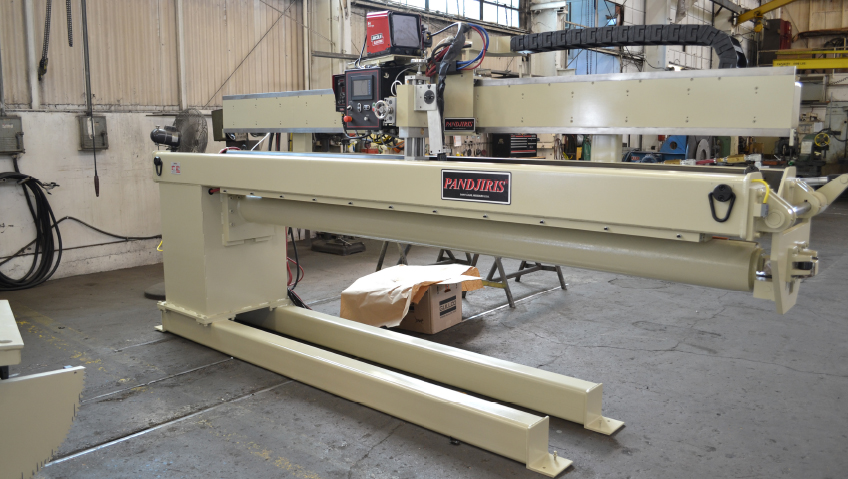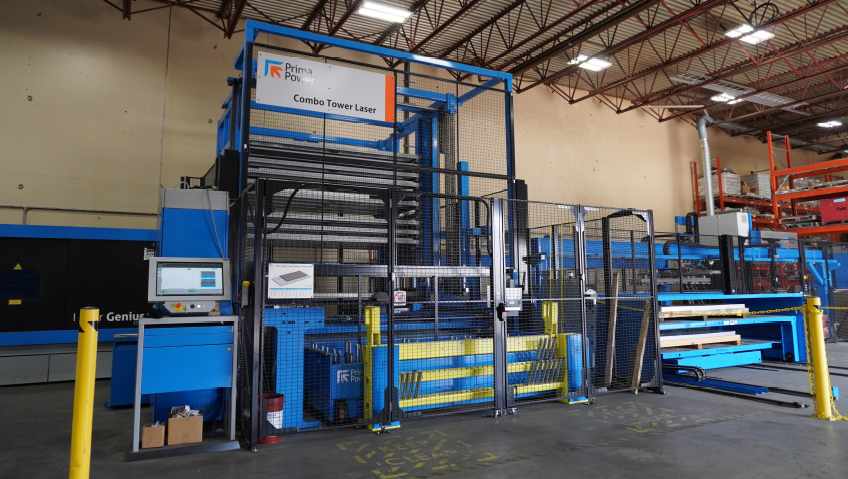In today’s world, words like “sustainable” and “renewable” are everywhere, but what do they really mean? For Hull Forest Products, these words are put into action every day, as they have been for decades. For almost 60 years, this Connecticut-based business has proudly offered customers wood products which are locally grown, sustainably harvested, and proudly rooted in America’s history.
The origin of Hull Forest Products goes back to the Great New England Hurricane of 1938, the most powerful and destructive storm in recorded history. Causing an estimated $620 million in damage, the hurricane left thousands homeless and uprooted approximately two billion trees. “Among those who set up portable mills to deal with the wood downed by the hurricane of ‘38 was my grandfather, Isaac Hull, whose Rhode Island community was devastated by the storm,” explains Mary Hull, Co-Owner and Marketing Communications Manager.
Getting the “sawmill bug,” Isaac Hull later set up a stationary circular mill behind his house. He was joined by his son, Bill (Mary’s father), who grew up tail sawing on the mill with his dad from age 10 and also learned how to cut cordwood on the family land and plant white pine. Eager to learn, 15-year-old Bill bought his first log truck and ran his own logging business in the summers while majoring in forestry at the University of New Hampshire. “He was so busy working, he didn’t have time to attend his own college graduation,” says Mary Hull.
In 1967, two years after founding the company, Bill purchased the first Pettibone forwarder ever sold east of the Mississippi River. A new concept at the time, forwarders were designed to efficiently extract and transport logs from the woods to the landing with minimal ground disturbance. “That made them a more versatile and environmentally friendly machine,” explains Hull. A few years later, in 1970, Hull Forest Products moved to its current Pomfret, Connecticut location, expanding to become the largest hardwood sawmill in southern New England.
The largest sawmill in the Metro NYC and Metro Boston area, Hull Forest Products is proud to supply customers with locally grown, sustainably harvested timber. This includes everything from sawdust and wood chips to NHLA grade lumber, industrial and pallet lumber, oak timbers, custom staircase treads, landings, risers, and nosings, made-in-America custom wide plank hardwood floors, and much more. In addition, Hull provides award-winning woodland management services to regional forest landowners. Supporting working woodlands, the company is proud to help local landowners “keep their forests as forests.”
Sustainability leaders
Forests are one of the world’s greatest resources, and must be treated with respect today, tomorrow, and long into the future. For Hull Forest Products, this includes key areas such as sustainable forestry, open space preservation, and forest conservation. In the United States, private landowners own the majority of forestland, and 90 percent of all U.S. wood products come from these private woodlands.
“To sustain these forests, we must sustain those who own them,” states Hull. “By providing a market for local wood, we help landowners derive income from their forest. Without this kind of market, subdivision and development can become a more attractive alternative to forestland for some landowners.”
Unlike public land, private forestland is an economic engine for rural America. For every forest-related job in the U.S., there are two indirectly related jobs in transportation, distribution, and sales. “We produce over 11 million board feet of hardwood lumber at our Connecticut sawmill each year, and our manufacturing also creates secondary jobs in pallet manufacturing, timber framing, firewood processing, and flooring installations,” says Hull. “We are part of southern New England’s agricultural industry, which contributes over $100 million to the regional economy annually. We are also a proud member of the ‘Connecticut Grown’ program, which connects consumers with producers of local agricultural products. On a national level, the forest products sector in the U.S. represents over $210 billion of gross domestic product.”
Today, the company’s licensed foresters steward over 30,000 acres of client forests in New England, helping forests and owners to thrive; in fact, the company has worked with some client families over successive generations. As a further commitment to the natural environment, the business is also behind Hull Forestlands L.P., the Hull family land trust. Over the years, Hull Forestlands has permanently protected more than 10,000 acres of its own forestland, with conservation easements preventing the land from ever being developed. Additionally, Hull’s southern New England land is also enrolled in the certified tree farm program and is third-party certified for sustainability by the American Tree Farm System.
Sustainable forest management has myriad positive environmental impacts, including carbon storage and supporting robust biodiversity. The finished product, wood, in fact has the least embodied energy of any building material. While wood products make up 47 percent of all industrial raw materials manufactured in the U.S., they consume just four percent of the total energy needed to manufacture all industrial raw materials, according to the Consortium for Research on Renewable Industrial Materials.
“We practice sustainable forest management, which has been recognized by the Intergovernmental Panel on Climage Change (IPCC) as an effective strategy for controlling greenhouse gas emissions (GHG),” Hull explains. “The GHG benefits of sustainable forest management include: forest regrowth after harvest; lower risk of wildfire; production of energy-efficient materials and biomass energy; and carbon sequestration in forests and in wood products.”
“These practices are not something that has to be done, but it’s something we really need to do for our industry,” says long-time Mill Manager Jon St. Jean. “We don’t do much planting, but we engage in the proper practices to promote future growth.”
Another way Hull Forest Products helps conserve working forests is by building partnerships with environmental groups. For the company, this often means giving up the development rights of its forests to groups that share Hull’s goals of sustainable forestry. By doing so, the value of the property is reduced, and taxes are lowered, with environmental organizations receiving credit for helping conserve the forest.
Some of the organizations Hull has partnered with include the Nature Conservancy, the New England Forestry Foundation, the Norcross Wildlife Foundation, the Massachusetts Division of Fisheries and Wildlife, the Connecticut Forest and Parks Association, Massachusetts Department of Conservation and Recreation, and the Springfield Water and Sewer Commission.
Hull Forest Products’ many environmental and sustainability initiatives have certainly not gone unnoticed. In 2019, Hull became the first company in New England to receive the Aldo Leopold Conservation Award. Presented to founder Bill Hull, the prestigious award acknowledges the company’s role in conserving the working forests of New England, both by working with landowners to grow value in their woodlands, and by providing a market and infrastructure for processing local timber.
This year, the company received a U.S. Forest Service Wood Innovations grant. This will support forest management by expanding local wood products manufacturing capacity; will increase market access; and will enable the company to invest in equipment that will increase throughput and manufacturing efficiency. “We have also received the Best of Houzz award—most recently in 2023, but also for 10 years in a row prior to that—for our outstanding customer service and wood flooring products,” adds Hull.
Earning trust
With a stellar reputation in the industry, Hull Forest Products is well known and respected. Products can be bought by coming to the company’s yard, and are sold primarily through manufacturers and local distributors, along with export. “We’ve sold into Mexico, most countries in Europe, the UK, Portugal, Spain, Germany, China, Vietnam, and Morocco,” says
Stephanie Van Dystadt, in charge of all lumber sales and procurement, “so we’ve sold into quite a few different areas.”
The reasons customers keep coming back to Hull include quality, consistency, and much more. Many clients prefer wood products made from North American tree species; working with its own timberlands and local partners means everything can be traced, from where the tree originated to how it was grown and harvested.
“That’s part of the story; we are selling sustainability,” says Van Dystadt. “It’s a renewable product, and we are doing things responsibly. We take pride in what that is and what we can offer—and I believe that’s why customers keep coming back. It’s always the same thing, and it’s consistent. If customers buy from us in one month or in three months, they know what they are getting, where it comes from, and that we’ve done everything responsibly.”
Along with factors like product selection, outstanding customer service, consistency, and quality, Hull Forest Products’ facility is National Hardwood Lumber Association (NHLA) certified, and grade certified. NHLA inspectors check random bundles to ensure grades, quality, and consistency. For customers, this means the product is the same every time, while the same cannot necessarily be said for some other producers who source from multiple suppliers and mix everything together, resulting in different moisture content or stress issues.
Indeed, “Honesty and reliability are two reasons why people choose Hull,” comments Van Dystadt. “We do what we say. We don’t just talk the talk; we walk the walk. In the age of the Internet, you can buy from anybody. With us, the store is there, and you can come and see for yourself. The founder of the company is still in the office 90 percent of the time, and very much involved on the timber side, so there is a long-term reputation. We are very well regarded among our peers and the community. When you hear the Hull name, it brings a sense of confidence. Customers know they are dealing with good people who are reliable and provide consistent, quality products,” she says.
The company remains proudly family-owned by Mary, her brothers Sam and Ben, and their father, Bill Hull. Committed to upholding the highest professional standards in the combined fields of forest management, timber harvesting, and wood products manufacturing, the company looks forward to celebrating its 60th anniversary next year. This will include a sawmill tour, with members of the public learning how Hull’s forest-based business stewards local woodlands and manufactures wood products for the global bioeconomy.
“We invite the public to tour our facility and watch us make products from local timber, learn about sustainable forestry, and understand how the use of forest-derived products increases the economic viability of local forests,” says Mary Hull. “Wood offers a unique opportunity to store carbon in the forest, but also in products and through substitution (by avoiding fossil-intensive products) while, at the same time, providing ecological services such as clean water, clean air, and wildlife habitat. Half of the weight of dry wood is stored carbon, and when used as a building material, wood stores that carbon for its full life cycle,” she explains. And with a service life of 100 years or more, wood can play a significant role in enabling the building and construction industries to reduce the environmental impact of building.
“Using wood from well-managed forests helps keep forests as forests,” she says. “We want people to understand why it’s good to use wood and to come away with an understanding of how wood products can help reduce greenhouse gas emissions and store carbon throughout their service life.”






